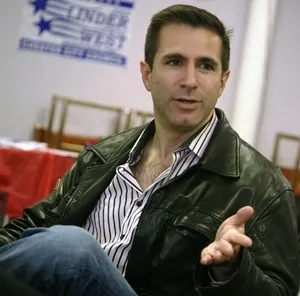Political Science Students Hit Local Campaign Trail, Connect with Community

Associate Professor of Political Science Ben Berger
This election season, Swarthmore students are out on the trail to mobilize local voters on a wide range of campaigns on both sides of the aisle. Far from being only a personal pursuit on campus, political engagement is also written into academic offerings, as many courses seek to link classrooms with surrounding communities and realities.
One such course is Associate Professor of Political Science Ben Berger's Democratic Theory and Practice. The class, which Berger has taught since 2002, requires that students participate in a community-based learning activity throughout the semester, extending the in-class conversations on the nature of democracy and civil society to a full semester of real political participation in Swarthmore and the surrounding communities.
"My students work to unpack the umbrella term 'civic engagement,' and they try to get more specific about the kinds of activities and involvements that make democracy work," says Berger about the use of community-based learning. "Students have a choice of political and non-political volunteer work, ranging from working with a political campaign, volunteering with a religious congregation, or helping to run youth courts in a Chester middle school. All are different from simply reading about democracy and civil society."
As Berger mentions, students have a variety of community-based learning activities to choose from, non-political as well as political, but one of the most popular options is assisting with electoral campaigns. Students in the course who are now on the campaign trail have found it extremely rewarding to be part of a dynamic political effort.
For Tessa Rhinehart '17 of Bradford, Pa., who has been working with Leanne Krueger-Braneky's (D) campaign for Pennsylvania's 161st Legislative District seat since the start of the semester, her work is about more than hearing a voter support her candidate.
"More than anything," she says, "I love when voters engage me in conversation about the issues. Sometimes people just open up: they'll tell you about their lives, tell you what issues are most important to them. Canvassing for the campaign has allowed me to connect with people I never would have met otherwise."
Her classmate in Berger's course, Patrick Holland '17 of Bethesda, Md., has been involved with political campaigns in the past, and this fall is campaigning for Tom McGarrigle (R), who is running for Pennsylvania's state senate, and Rep. Pat Meehan (R), who is running for re-election in Pennsylvania's 7th congressional district. Holland has enjoyed that his role has changed based on what the campaign needs. "As an intern with the campaign, I'm pretty much expected to help out with everything," he says, nothing that he was recently passing out literature with McGarrigle at the Swarthmore SEPTA stop while also going door to door and attending fundraisers.
In dialogue with what students read, write, and explore in Berger's course, campaign engagement lets them make their own strong connections from that material to hands-on politics. Rhinehart expresses that, "as a volunteer, not only am I politically active, but I also get to learn about the activity of others, who range from politically apathetic to extremely attentive to and engaged in the political process. These experiences allow me to more critically examine theories about political engagement."
Holland articulates how important this community-based perspective is for him, and sums up why courses like Berger's matter for a college committed to a world outside its walls. "I now feel like I have a connection to community outside Swarthmore," he says. "It's let me break out of the Swat bubble. I can navigate around the area now without too much worry, I know about local issues, and I feel like I'm a citizen of Delaware County more than ever."



